Transition to Practice: New Nurse Experiences in Australia
VerifiedAdded on 2023/06/04
|12
|3098
|281
Report
AI Summary
This report explores the experiences of new graduate nurses as they transition from academia to clinical practice in Australia. It highlights the challenges they face, including increasing patient complexity, bullying, fatigue, and inadequate mentorship. The report discusses the significance of these issues, emphasizing their impact on the quality of patient care and nurse retention. It evaluates strategies to support new nurses, such as mentorship programs, residency programs, involving nurses in decision-making processes, and promoting academic progression through advanced degrees. The conclusion emphasizes the importance of addressing these challenges to ensure a smooth transition for new nurses and maintain a balance between patient needs and healthcare provider well-being, advocating for the implementation of supportive strategies by all stakeholders in the health sector. This resource is available for students seeking similar materials and study tools on Desklib.
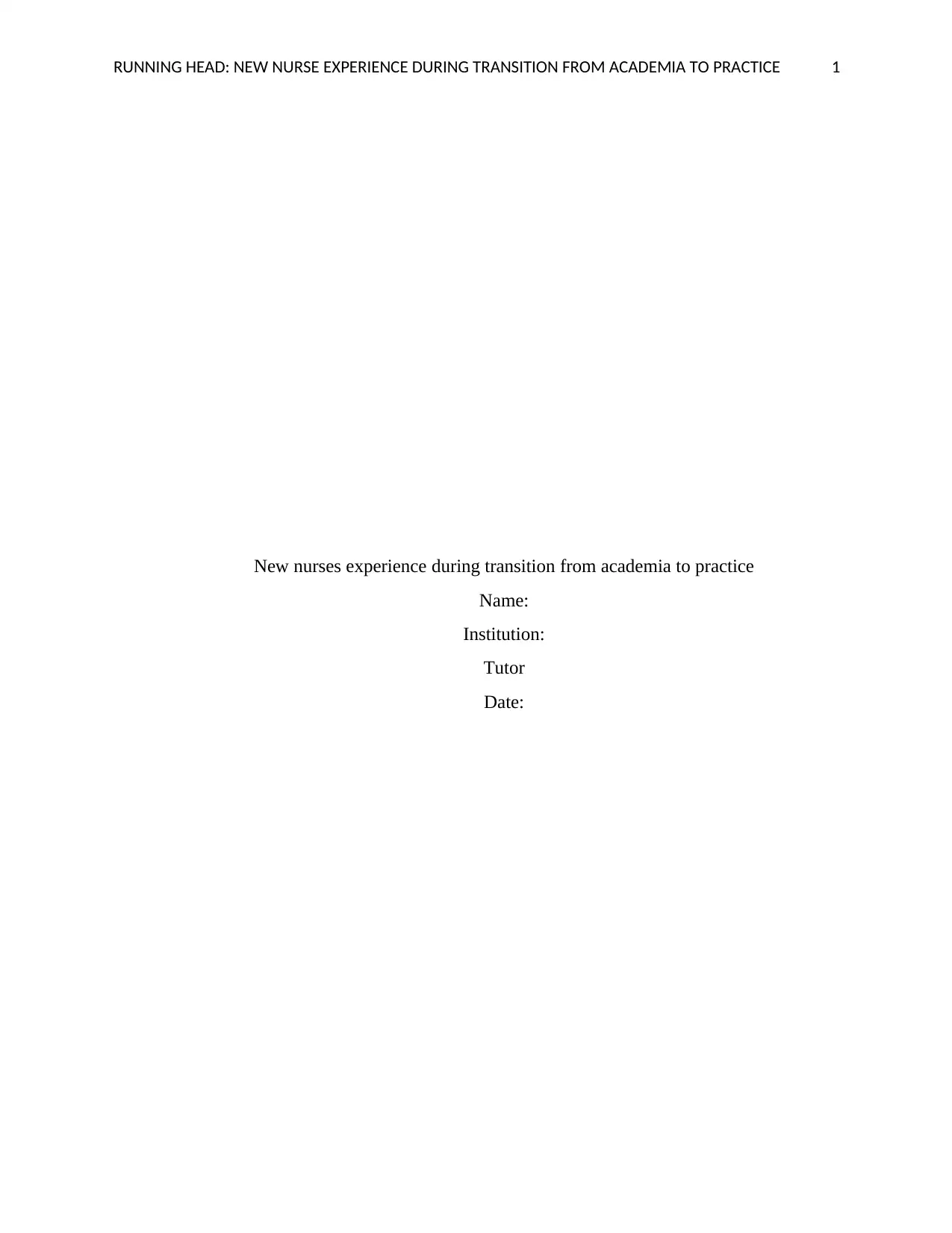
RUNNING HEAD: NEW NURSE EXPERIENCE DURING TRANSITION FROM ACADEMIA TO PRACTICE 1
New nurses experience during transition from academia to practice
Name:
Institution:
Tutor
Date:
New nurses experience during transition from academia to practice
Name:
Institution:
Tutor
Date:
Paraphrase This Document
Need a fresh take? Get an instant paraphrase of this document with our AI Paraphraser
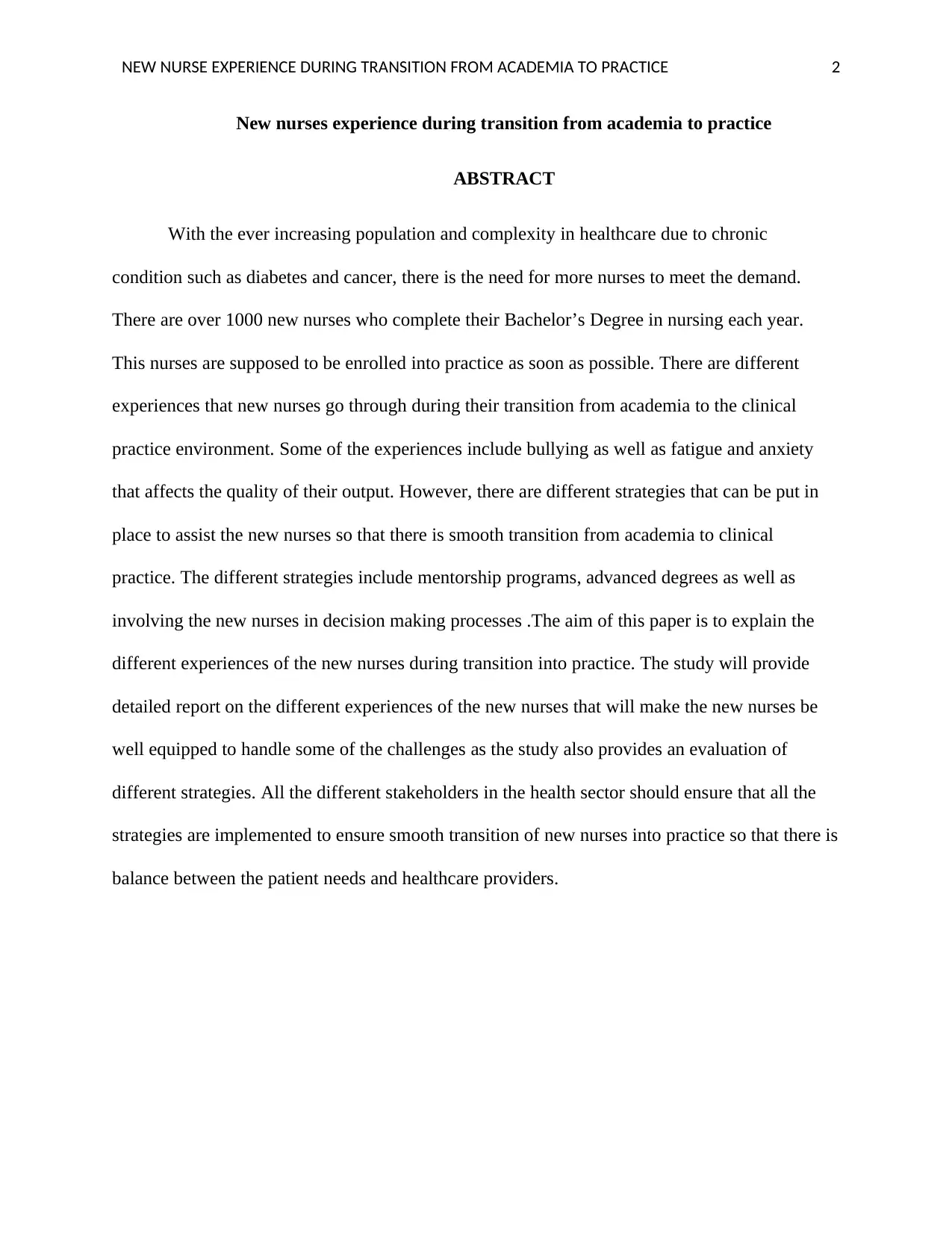
NEW NURSE EXPERIENCE DURING TRANSITION FROM ACADEMIA TO PRACTICE 2
New nurses experience during transition from academia to practice
ABSTRACT
With the ever increasing population and complexity in healthcare due to chronic
condition such as diabetes and cancer, there is the need for more nurses to meet the demand.
There are over 1000 new nurses who complete their Bachelor’s Degree in nursing each year.
This nurses are supposed to be enrolled into practice as soon as possible. There are different
experiences that new nurses go through during their transition from academia to the clinical
practice environment. Some of the experiences include bullying as well as fatigue and anxiety
that affects the quality of their output. However, there are different strategies that can be put in
place to assist the new nurses so that there is smooth transition from academia to clinical
practice. The different strategies include mentorship programs, advanced degrees as well as
involving the new nurses in decision making processes .The aim of this paper is to explain the
different experiences of the new nurses during transition into practice. The study will provide
detailed report on the different experiences of the new nurses that will make the new nurses be
well equipped to handle some of the challenges as the study also provides an evaluation of
different strategies. All the different stakeholders in the health sector should ensure that all the
strategies are implemented to ensure smooth transition of new nurses into practice so that there is
balance between the patient needs and healthcare providers.
New nurses experience during transition from academia to practice
ABSTRACT
With the ever increasing population and complexity in healthcare due to chronic
condition such as diabetes and cancer, there is the need for more nurses to meet the demand.
There are over 1000 new nurses who complete their Bachelor’s Degree in nursing each year.
This nurses are supposed to be enrolled into practice as soon as possible. There are different
experiences that new nurses go through during their transition from academia to the clinical
practice environment. Some of the experiences include bullying as well as fatigue and anxiety
that affects the quality of their output. However, there are different strategies that can be put in
place to assist the new nurses so that there is smooth transition from academia to clinical
practice. The different strategies include mentorship programs, advanced degrees as well as
involving the new nurses in decision making processes .The aim of this paper is to explain the
different experiences of the new nurses during transition into practice. The study will provide
detailed report on the different experiences of the new nurses that will make the new nurses be
well equipped to handle some of the challenges as the study also provides an evaluation of
different strategies. All the different stakeholders in the health sector should ensure that all the
strategies are implemented to ensure smooth transition of new nurses into practice so that there is
balance between the patient needs and healthcare providers.
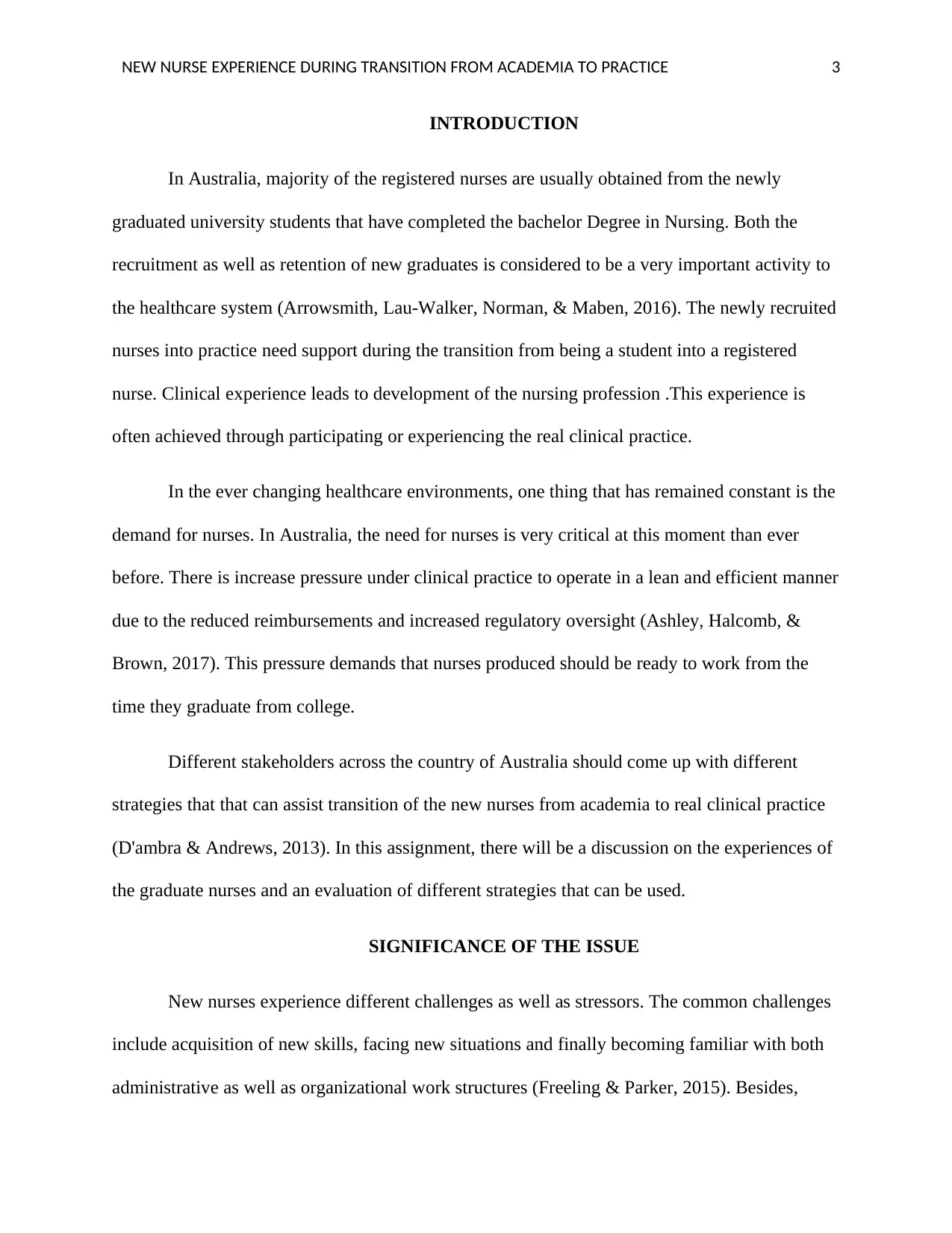
NEW NURSE EXPERIENCE DURING TRANSITION FROM ACADEMIA TO PRACTICE 3
INTRODUCTION
In Australia, majority of the registered nurses are usually obtained from the newly
graduated university students that have completed the bachelor Degree in Nursing. Both the
recruitment as well as retention of new graduates is considered to be a very important activity to
the healthcare system (Arrowsmith, Lau-Walker, Norman, & Maben, 2016). The newly recruited
nurses into practice need support during the transition from being a student into a registered
nurse. Clinical experience leads to development of the nursing profession .This experience is
often achieved through participating or experiencing the real clinical practice.
In the ever changing healthcare environments, one thing that has remained constant is the
demand for nurses. In Australia, the need for nurses is very critical at this moment than ever
before. There is increase pressure under clinical practice to operate in a lean and efficient manner
due to the reduced reimbursements and increased regulatory oversight (Ashley, Halcomb, &
Brown, 2017). This pressure demands that nurses produced should be ready to work from the
time they graduate from college.
Different stakeholders across the country of Australia should come up with different
strategies that that can assist transition of the new nurses from academia to real clinical practice
(D'ambra & Andrews, 2013). In this assignment, there will be a discussion on the experiences of
the graduate nurses and an evaluation of different strategies that can be used.
SIGNIFICANCE OF THE ISSUE
New nurses experience different challenges as well as stressors. The common challenges
include acquisition of new skills, facing new situations and finally becoming familiar with both
administrative as well as organizational work structures (Freeling & Parker, 2015). Besides,
INTRODUCTION
In Australia, majority of the registered nurses are usually obtained from the newly
graduated university students that have completed the bachelor Degree in Nursing. Both the
recruitment as well as retention of new graduates is considered to be a very important activity to
the healthcare system (Arrowsmith, Lau-Walker, Norman, & Maben, 2016). The newly recruited
nurses into practice need support during the transition from being a student into a registered
nurse. Clinical experience leads to development of the nursing profession .This experience is
often achieved through participating or experiencing the real clinical practice.
In the ever changing healthcare environments, one thing that has remained constant is the
demand for nurses. In Australia, the need for nurses is very critical at this moment than ever
before. There is increase pressure under clinical practice to operate in a lean and efficient manner
due to the reduced reimbursements and increased regulatory oversight (Ashley, Halcomb, &
Brown, 2017). This pressure demands that nurses produced should be ready to work from the
time they graduate from college.
Different stakeholders across the country of Australia should come up with different
strategies that that can assist transition of the new nurses from academia to real clinical practice
(D'ambra & Andrews, 2013). In this assignment, there will be a discussion on the experiences of
the graduate nurses and an evaluation of different strategies that can be used.
SIGNIFICANCE OF THE ISSUE
New nurses experience different challenges as well as stressors. The common challenges
include acquisition of new skills, facing new situations and finally becoming familiar with both
administrative as well as organizational work structures (Freeling & Parker, 2015). Besides,
⊘ This is a preview!⊘
Do you want full access?
Subscribe today to unlock all pages.

Trusted by 1+ million students worldwide
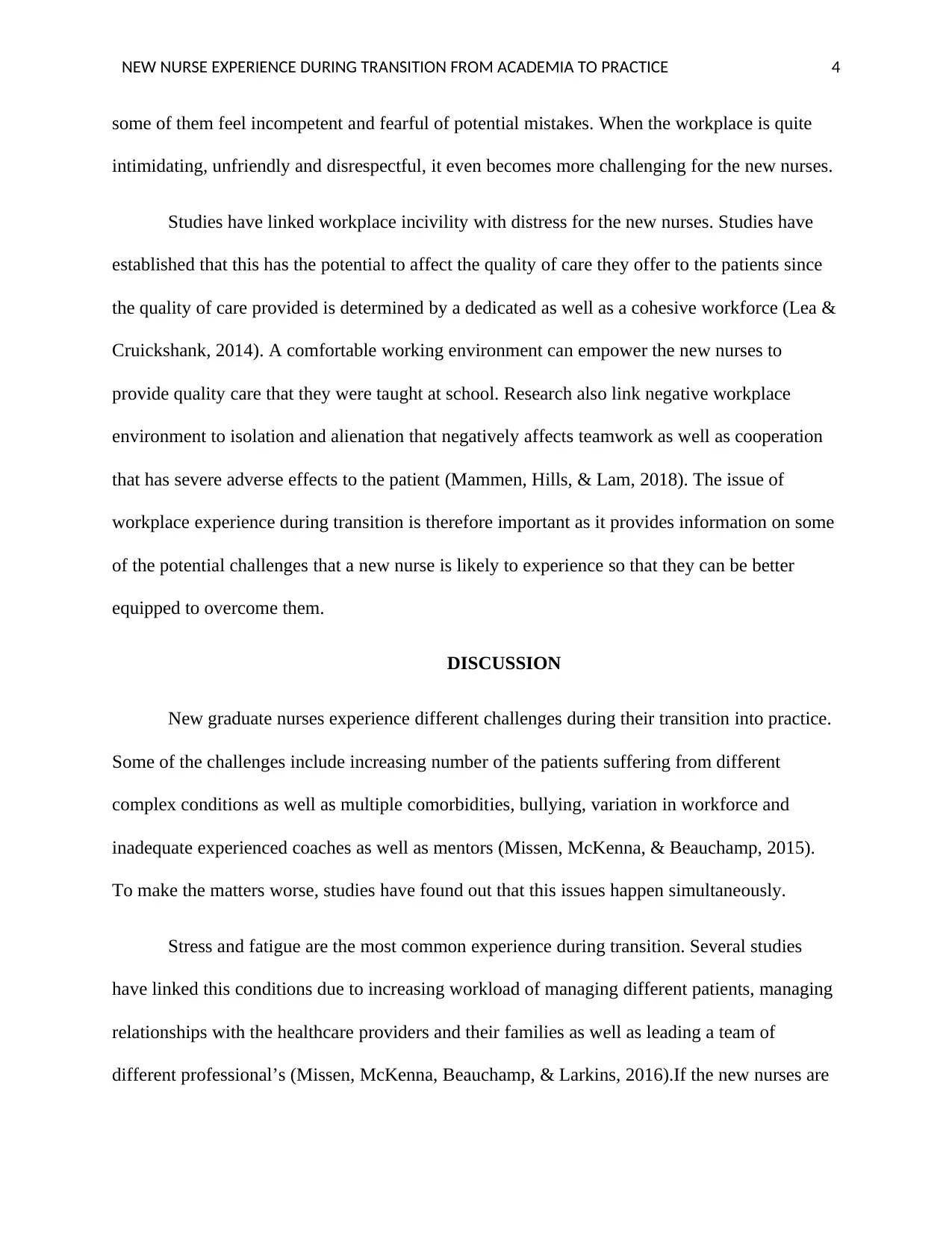
NEW NURSE EXPERIENCE DURING TRANSITION FROM ACADEMIA TO PRACTICE 4
some of them feel incompetent and fearful of potential mistakes. When the workplace is quite
intimidating, unfriendly and disrespectful, it even becomes more challenging for the new nurses.
Studies have linked workplace incivility with distress for the new nurses. Studies have
established that this has the potential to affect the quality of care they offer to the patients since
the quality of care provided is determined by a dedicated as well as a cohesive workforce (Lea &
Cruickshank, 2014). A comfortable working environment can empower the new nurses to
provide quality care that they were taught at school. Research also link negative workplace
environment to isolation and alienation that negatively affects teamwork as well as cooperation
that has severe adverse effects to the patient (Mammen, Hills, & Lam, 2018). The issue of
workplace experience during transition is therefore important as it provides information on some
of the potential challenges that a new nurse is likely to experience so that they can be better
equipped to overcome them.
DISCUSSION
New graduate nurses experience different challenges during their transition into practice.
Some of the challenges include increasing number of the patients suffering from different
complex conditions as well as multiple comorbidities, bullying, variation in workforce and
inadequate experienced coaches as well as mentors (Missen, McKenna, & Beauchamp, 2015).
To make the matters worse, studies have found out that this issues happen simultaneously.
Stress and fatigue are the most common experience during transition. Several studies
have linked this conditions due to increasing workload of managing different patients, managing
relationships with the healthcare providers and their families as well as leading a team of
different professional’s (Missen, McKenna, Beauchamp, & Larkins, 2016).If the new nurses are
some of them feel incompetent and fearful of potential mistakes. When the workplace is quite
intimidating, unfriendly and disrespectful, it even becomes more challenging for the new nurses.
Studies have linked workplace incivility with distress for the new nurses. Studies have
established that this has the potential to affect the quality of care they offer to the patients since
the quality of care provided is determined by a dedicated as well as a cohesive workforce (Lea &
Cruickshank, 2014). A comfortable working environment can empower the new nurses to
provide quality care that they were taught at school. Research also link negative workplace
environment to isolation and alienation that negatively affects teamwork as well as cooperation
that has severe adverse effects to the patient (Mammen, Hills, & Lam, 2018). The issue of
workplace experience during transition is therefore important as it provides information on some
of the potential challenges that a new nurse is likely to experience so that they can be better
equipped to overcome them.
DISCUSSION
New graduate nurses experience different challenges during their transition into practice.
Some of the challenges include increasing number of the patients suffering from different
complex conditions as well as multiple comorbidities, bullying, variation in workforce and
inadequate experienced coaches as well as mentors (Missen, McKenna, & Beauchamp, 2015).
To make the matters worse, studies have found out that this issues happen simultaneously.
Stress and fatigue are the most common experience during transition. Several studies
have linked this conditions due to increasing workload of managing different patients, managing
relationships with the healthcare providers and their families as well as leading a team of
different professional’s (Missen, McKenna, Beauchamp, & Larkins, 2016).If the new nurses are
Paraphrase This Document
Need a fresh take? Get an instant paraphrase of this document with our AI Paraphraser
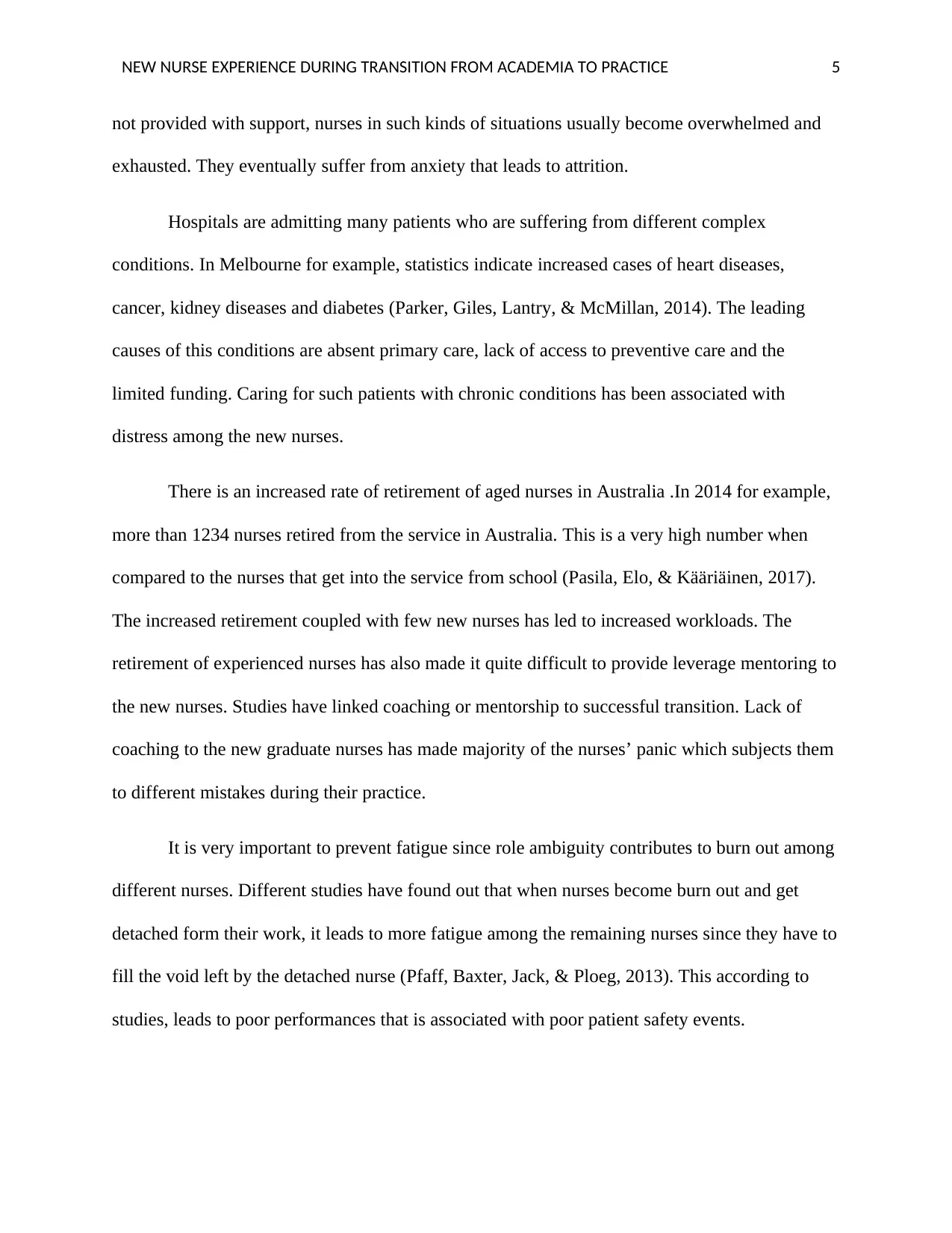
NEW NURSE EXPERIENCE DURING TRANSITION FROM ACADEMIA TO PRACTICE 5
not provided with support, nurses in such kinds of situations usually become overwhelmed and
exhausted. They eventually suffer from anxiety that leads to attrition.
Hospitals are admitting many patients who are suffering from different complex
conditions. In Melbourne for example, statistics indicate increased cases of heart diseases,
cancer, kidney diseases and diabetes (Parker, Giles, Lantry, & McMillan, 2014). The leading
causes of this conditions are absent primary care, lack of access to preventive care and the
limited funding. Caring for such patients with chronic conditions has been associated with
distress among the new nurses.
There is an increased rate of retirement of aged nurses in Australia .In 2014 for example,
more than 1234 nurses retired from the service in Australia. This is a very high number when
compared to the nurses that get into the service from school (Pasila, Elo, & Kääriäinen, 2017).
The increased retirement coupled with few new nurses has led to increased workloads. The
retirement of experienced nurses has also made it quite difficult to provide leverage mentoring to
the new nurses. Studies have linked coaching or mentorship to successful transition. Lack of
coaching to the new graduate nurses has made majority of the nurses’ panic which subjects them
to different mistakes during their practice.
It is very important to prevent fatigue since role ambiguity contributes to burn out among
different nurses. Different studies have found out that when nurses become burn out and get
detached form their work, it leads to more fatigue among the remaining nurses since they have to
fill the void left by the detached nurse (Pfaff, Baxter, Jack, & Ploeg, 2013). This according to
studies, leads to poor performances that is associated with poor patient safety events.
not provided with support, nurses in such kinds of situations usually become overwhelmed and
exhausted. They eventually suffer from anxiety that leads to attrition.
Hospitals are admitting many patients who are suffering from different complex
conditions. In Melbourne for example, statistics indicate increased cases of heart diseases,
cancer, kidney diseases and diabetes (Parker, Giles, Lantry, & McMillan, 2014). The leading
causes of this conditions are absent primary care, lack of access to preventive care and the
limited funding. Caring for such patients with chronic conditions has been associated with
distress among the new nurses.
There is an increased rate of retirement of aged nurses in Australia .In 2014 for example,
more than 1234 nurses retired from the service in Australia. This is a very high number when
compared to the nurses that get into the service from school (Pasila, Elo, & Kääriäinen, 2017).
The increased retirement coupled with few new nurses has led to increased workloads. The
retirement of experienced nurses has also made it quite difficult to provide leverage mentoring to
the new nurses. Studies have linked coaching or mentorship to successful transition. Lack of
coaching to the new graduate nurses has made majority of the nurses’ panic which subjects them
to different mistakes during their practice.
It is very important to prevent fatigue since role ambiguity contributes to burn out among
different nurses. Different studies have found out that when nurses become burn out and get
detached form their work, it leads to more fatigue among the remaining nurses since they have to
fill the void left by the detached nurse (Pfaff, Baxter, Jack, & Ploeg, 2013). This according to
studies, leads to poor performances that is associated with poor patient safety events.
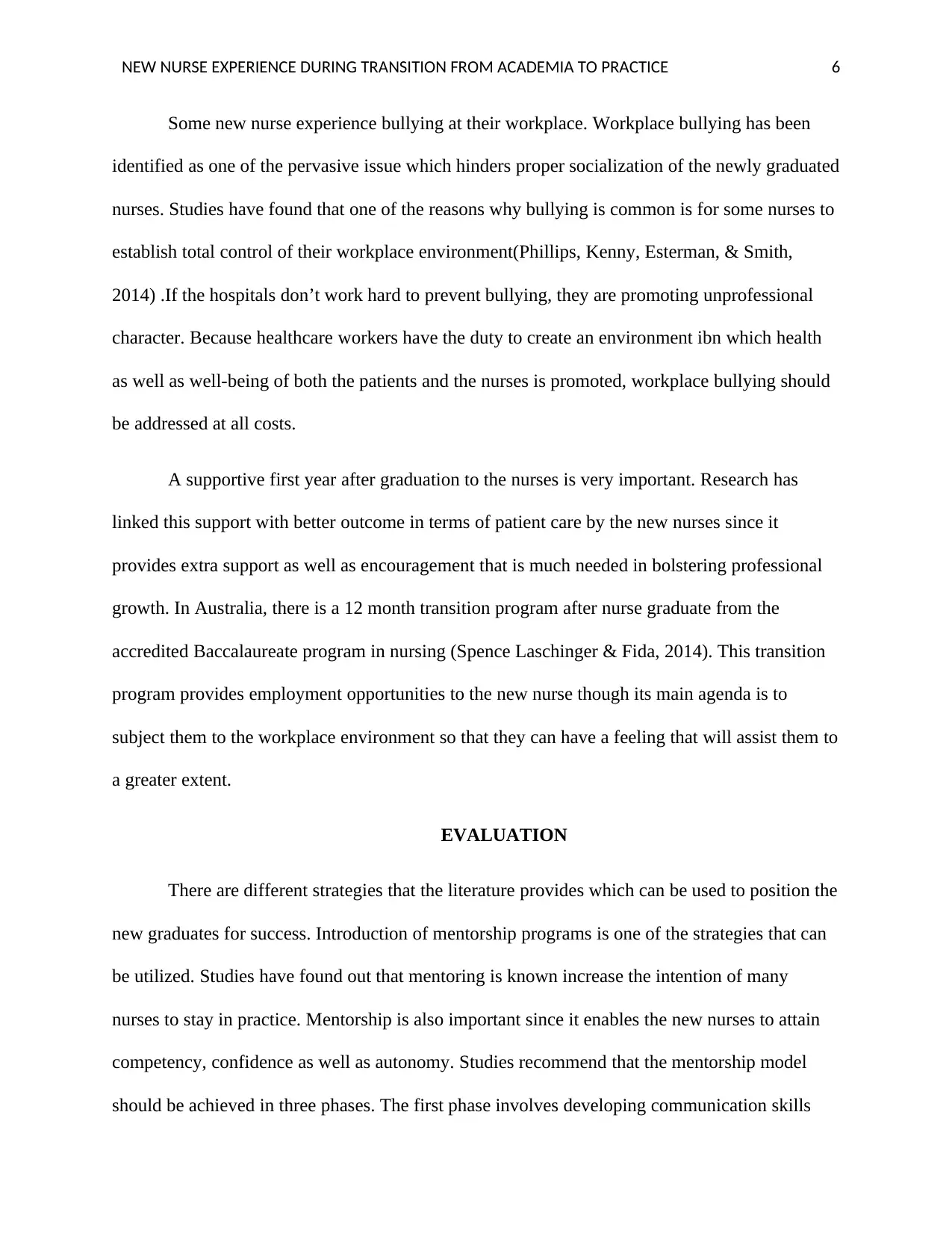
NEW NURSE EXPERIENCE DURING TRANSITION FROM ACADEMIA TO PRACTICE 6
Some new nurse experience bullying at their workplace. Workplace bullying has been
identified as one of the pervasive issue which hinders proper socialization of the newly graduated
nurses. Studies have found that one of the reasons why bullying is common is for some nurses to
establish total control of their workplace environment(Phillips, Kenny, Esterman, & Smith,
2014) .If the hospitals don’t work hard to prevent bullying, they are promoting unprofessional
character. Because healthcare workers have the duty to create an environment ibn which health
as well as well-being of both the patients and the nurses is promoted, workplace bullying should
be addressed at all costs.
A supportive first year after graduation to the nurses is very important. Research has
linked this support with better outcome in terms of patient care by the new nurses since it
provides extra support as well as encouragement that is much needed in bolstering professional
growth. In Australia, there is a 12 month transition program after nurse graduate from the
accredited Baccalaureate program in nursing (Spence Laschinger & Fida, 2014). This transition
program provides employment opportunities to the new nurse though its main agenda is to
subject them to the workplace environment so that they can have a feeling that will assist them to
a greater extent.
EVALUATION
There are different strategies that the literature provides which can be used to position the
new graduates for success. Introduction of mentorship programs is one of the strategies that can
be utilized. Studies have found out that mentoring is known increase the intention of many
nurses to stay in practice. Mentorship is also important since it enables the new nurses to attain
competency, confidence as well as autonomy. Studies recommend that the mentorship model
should be achieved in three phases. The first phase involves developing communication skills
Some new nurse experience bullying at their workplace. Workplace bullying has been
identified as one of the pervasive issue which hinders proper socialization of the newly graduated
nurses. Studies have found that one of the reasons why bullying is common is for some nurses to
establish total control of their workplace environment(Phillips, Kenny, Esterman, & Smith,
2014) .If the hospitals don’t work hard to prevent bullying, they are promoting unprofessional
character. Because healthcare workers have the duty to create an environment ibn which health
as well as well-being of both the patients and the nurses is promoted, workplace bullying should
be addressed at all costs.
A supportive first year after graduation to the nurses is very important. Research has
linked this support with better outcome in terms of patient care by the new nurses since it
provides extra support as well as encouragement that is much needed in bolstering professional
growth. In Australia, there is a 12 month transition program after nurse graduate from the
accredited Baccalaureate program in nursing (Spence Laschinger & Fida, 2014). This transition
program provides employment opportunities to the new nurse though its main agenda is to
subject them to the workplace environment so that they can have a feeling that will assist them to
a greater extent.
EVALUATION
There are different strategies that the literature provides which can be used to position the
new graduates for success. Introduction of mentorship programs is one of the strategies that can
be utilized. Studies have found out that mentoring is known increase the intention of many
nurses to stay in practice. Mentorship is also important since it enables the new nurses to attain
competency, confidence as well as autonomy. Studies recommend that the mentorship model
should be achieved in three phases. The first phase involves developing communication skills
⊘ This is a preview!⊘
Do you want full access?
Subscribe today to unlock all pages.

Trusted by 1+ million students worldwide
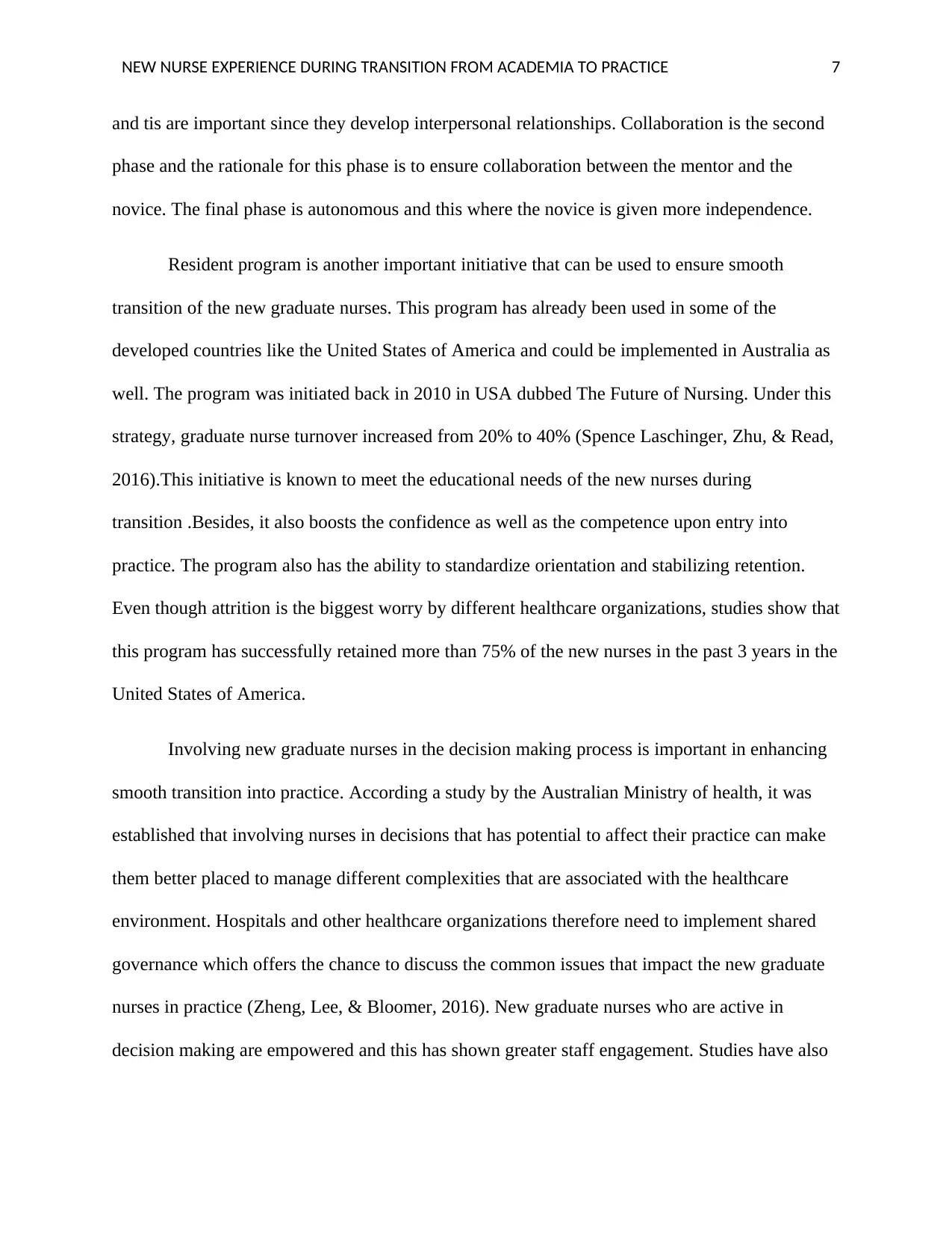
NEW NURSE EXPERIENCE DURING TRANSITION FROM ACADEMIA TO PRACTICE 7
and tis are important since they develop interpersonal relationships. Collaboration is the second
phase and the rationale for this phase is to ensure collaboration between the mentor and the
novice. The final phase is autonomous and this where the novice is given more independence.
Resident program is another important initiative that can be used to ensure smooth
transition of the new graduate nurses. This program has already been used in some of the
developed countries like the United States of America and could be implemented in Australia as
well. The program was initiated back in 2010 in USA dubbed The Future of Nursing. Under this
strategy, graduate nurse turnover increased from 20% to 40% (Spence Laschinger, Zhu, & Read,
2016).This initiative is known to meet the educational needs of the new nurses during
transition .Besides, it also boosts the confidence as well as the competence upon entry into
practice. The program also has the ability to standardize orientation and stabilizing retention.
Even though attrition is the biggest worry by different healthcare organizations, studies show that
this program has successfully retained more than 75% of the new nurses in the past 3 years in the
United States of America.
Involving new graduate nurses in the decision making process is important in enhancing
smooth transition into practice. According a study by the Australian Ministry of health, it was
established that involving nurses in decisions that has potential to affect their practice can make
them better placed to manage different complexities that are associated with the healthcare
environment. Hospitals and other healthcare organizations therefore need to implement shared
governance which offers the chance to discuss the common issues that impact the new graduate
nurses in practice (Zheng, Lee, & Bloomer, 2016). New graduate nurses who are active in
decision making are empowered and this has shown greater staff engagement. Studies have also
and tis are important since they develop interpersonal relationships. Collaboration is the second
phase and the rationale for this phase is to ensure collaboration between the mentor and the
novice. The final phase is autonomous and this where the novice is given more independence.
Resident program is another important initiative that can be used to ensure smooth
transition of the new graduate nurses. This program has already been used in some of the
developed countries like the United States of America and could be implemented in Australia as
well. The program was initiated back in 2010 in USA dubbed The Future of Nursing. Under this
strategy, graduate nurse turnover increased from 20% to 40% (Spence Laschinger, Zhu, & Read,
2016).This initiative is known to meet the educational needs of the new nurses during
transition .Besides, it also boosts the confidence as well as the competence upon entry into
practice. The program also has the ability to standardize orientation and stabilizing retention.
Even though attrition is the biggest worry by different healthcare organizations, studies show that
this program has successfully retained more than 75% of the new nurses in the past 3 years in the
United States of America.
Involving new graduate nurses in the decision making process is important in enhancing
smooth transition into practice. According a study by the Australian Ministry of health, it was
established that involving nurses in decisions that has potential to affect their practice can make
them better placed to manage different complexities that are associated with the healthcare
environment. Hospitals and other healthcare organizations therefore need to implement shared
governance which offers the chance to discuss the common issues that impact the new graduate
nurses in practice (Zheng, Lee, & Bloomer, 2016). New graduate nurses who are active in
decision making are empowered and this has shown greater staff engagement. Studies have also
Paraphrase This Document
Need a fresh take? Get an instant paraphrase of this document with our AI Paraphraser
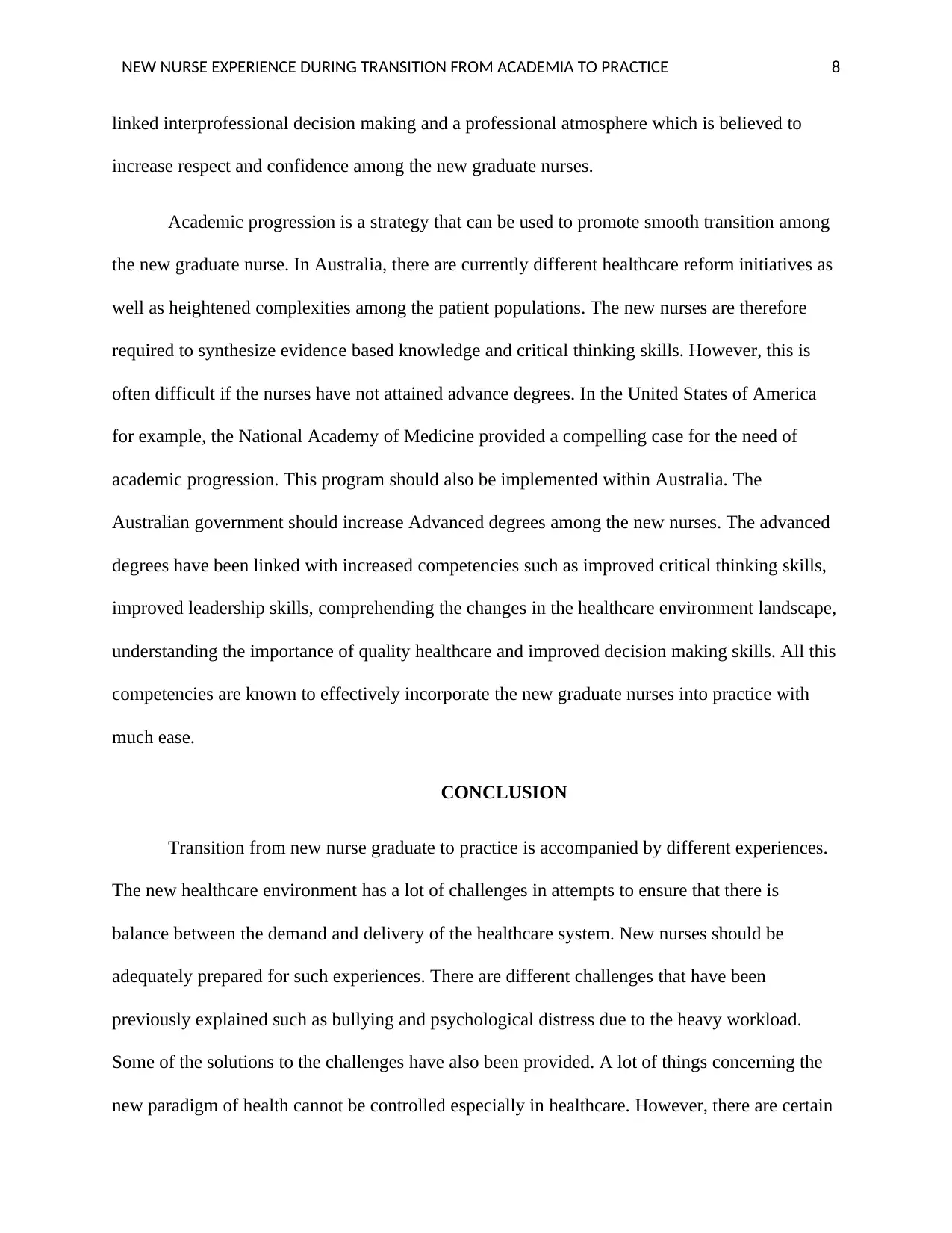
NEW NURSE EXPERIENCE DURING TRANSITION FROM ACADEMIA TO PRACTICE 8
linked interprofessional decision making and a professional atmosphere which is believed to
increase respect and confidence among the new graduate nurses.
Academic progression is a strategy that can be used to promote smooth transition among
the new graduate nurse. In Australia, there are currently different healthcare reform initiatives as
well as heightened complexities among the patient populations. The new nurses are therefore
required to synthesize evidence based knowledge and critical thinking skills. However, this is
often difficult if the nurses have not attained advance degrees. In the United States of America
for example, the National Academy of Medicine provided a compelling case for the need of
academic progression. This program should also be implemented within Australia. The
Australian government should increase Advanced degrees among the new nurses. The advanced
degrees have been linked with increased competencies such as improved critical thinking skills,
improved leadership skills, comprehending the changes in the healthcare environment landscape,
understanding the importance of quality healthcare and improved decision making skills. All this
competencies are known to effectively incorporate the new graduate nurses into practice with
much ease.
CONCLUSION
Transition from new nurse graduate to practice is accompanied by different experiences.
The new healthcare environment has a lot of challenges in attempts to ensure that there is
balance between the demand and delivery of the healthcare system. New nurses should be
adequately prepared for such experiences. There are different challenges that have been
previously explained such as bullying and psychological distress due to the heavy workload.
Some of the solutions to the challenges have also been provided. A lot of things concerning the
new paradigm of health cannot be controlled especially in healthcare. However, there are certain
linked interprofessional decision making and a professional atmosphere which is believed to
increase respect and confidence among the new graduate nurses.
Academic progression is a strategy that can be used to promote smooth transition among
the new graduate nurse. In Australia, there are currently different healthcare reform initiatives as
well as heightened complexities among the patient populations. The new nurses are therefore
required to synthesize evidence based knowledge and critical thinking skills. However, this is
often difficult if the nurses have not attained advance degrees. In the United States of America
for example, the National Academy of Medicine provided a compelling case for the need of
academic progression. This program should also be implemented within Australia. The
Australian government should increase Advanced degrees among the new nurses. The advanced
degrees have been linked with increased competencies such as improved critical thinking skills,
improved leadership skills, comprehending the changes in the healthcare environment landscape,
understanding the importance of quality healthcare and improved decision making skills. All this
competencies are known to effectively incorporate the new graduate nurses into practice with
much ease.
CONCLUSION
Transition from new nurse graduate to practice is accompanied by different experiences.
The new healthcare environment has a lot of challenges in attempts to ensure that there is
balance between the demand and delivery of the healthcare system. New nurses should be
adequately prepared for such experiences. There are different challenges that have been
previously explained such as bullying and psychological distress due to the heavy workload.
Some of the solutions to the challenges have also been provided. A lot of things concerning the
new paradigm of health cannot be controlled especially in healthcare. However, there are certain
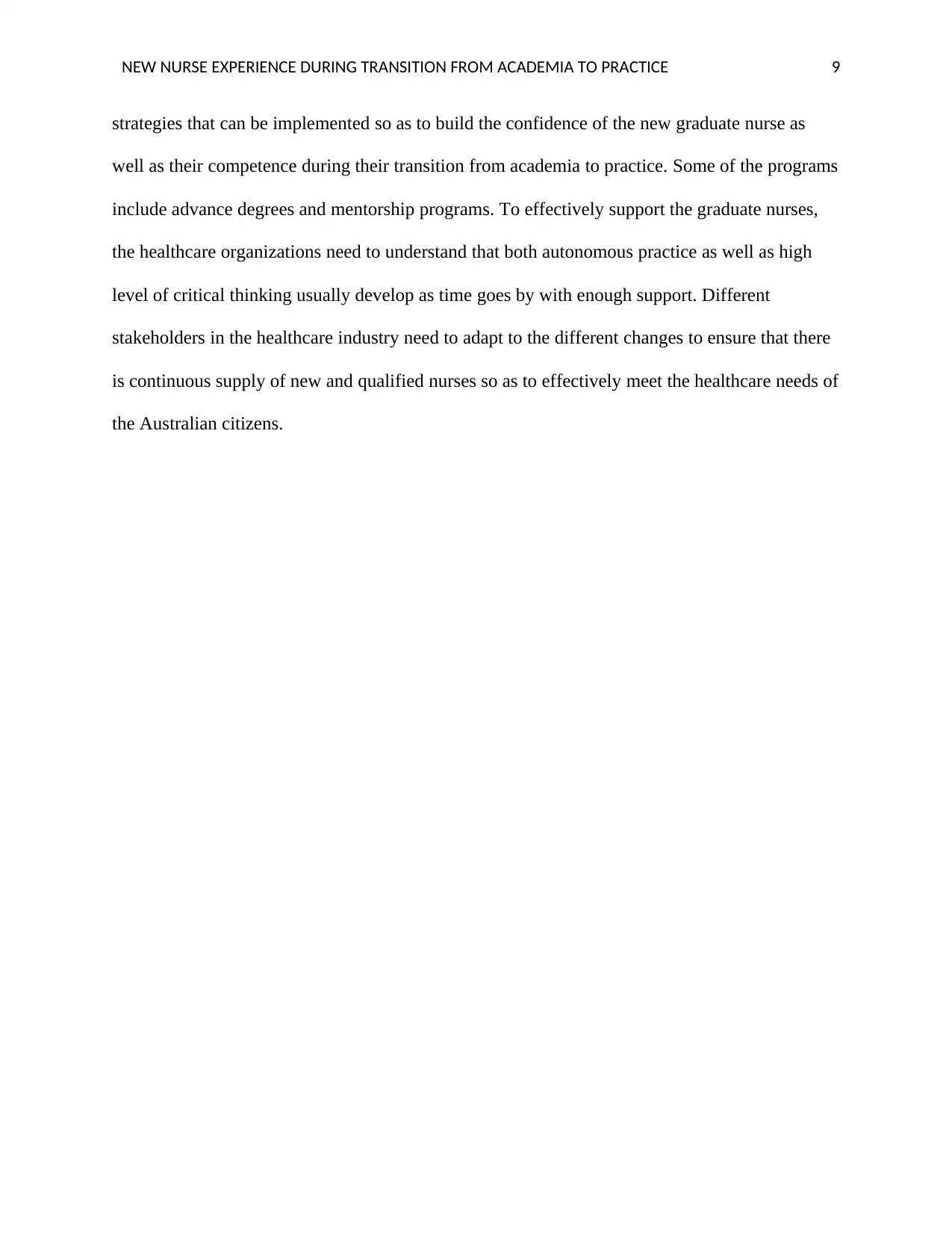
NEW NURSE EXPERIENCE DURING TRANSITION FROM ACADEMIA TO PRACTICE 9
strategies that can be implemented so as to build the confidence of the new graduate nurse as
well as their competence during their transition from academia to practice. Some of the programs
include advance degrees and mentorship programs. To effectively support the graduate nurses,
the healthcare organizations need to understand that both autonomous practice as well as high
level of critical thinking usually develop as time goes by with enough support. Different
stakeholders in the healthcare industry need to adapt to the different changes to ensure that there
is continuous supply of new and qualified nurses so as to effectively meet the healthcare needs of
the Australian citizens.
strategies that can be implemented so as to build the confidence of the new graduate nurse as
well as their competence during their transition from academia to practice. Some of the programs
include advance degrees and mentorship programs. To effectively support the graduate nurses,
the healthcare organizations need to understand that both autonomous practice as well as high
level of critical thinking usually develop as time goes by with enough support. Different
stakeholders in the healthcare industry need to adapt to the different changes to ensure that there
is continuous supply of new and qualified nurses so as to effectively meet the healthcare needs of
the Australian citizens.
⊘ This is a preview!⊘
Do you want full access?
Subscribe today to unlock all pages.

Trusted by 1+ million students worldwide
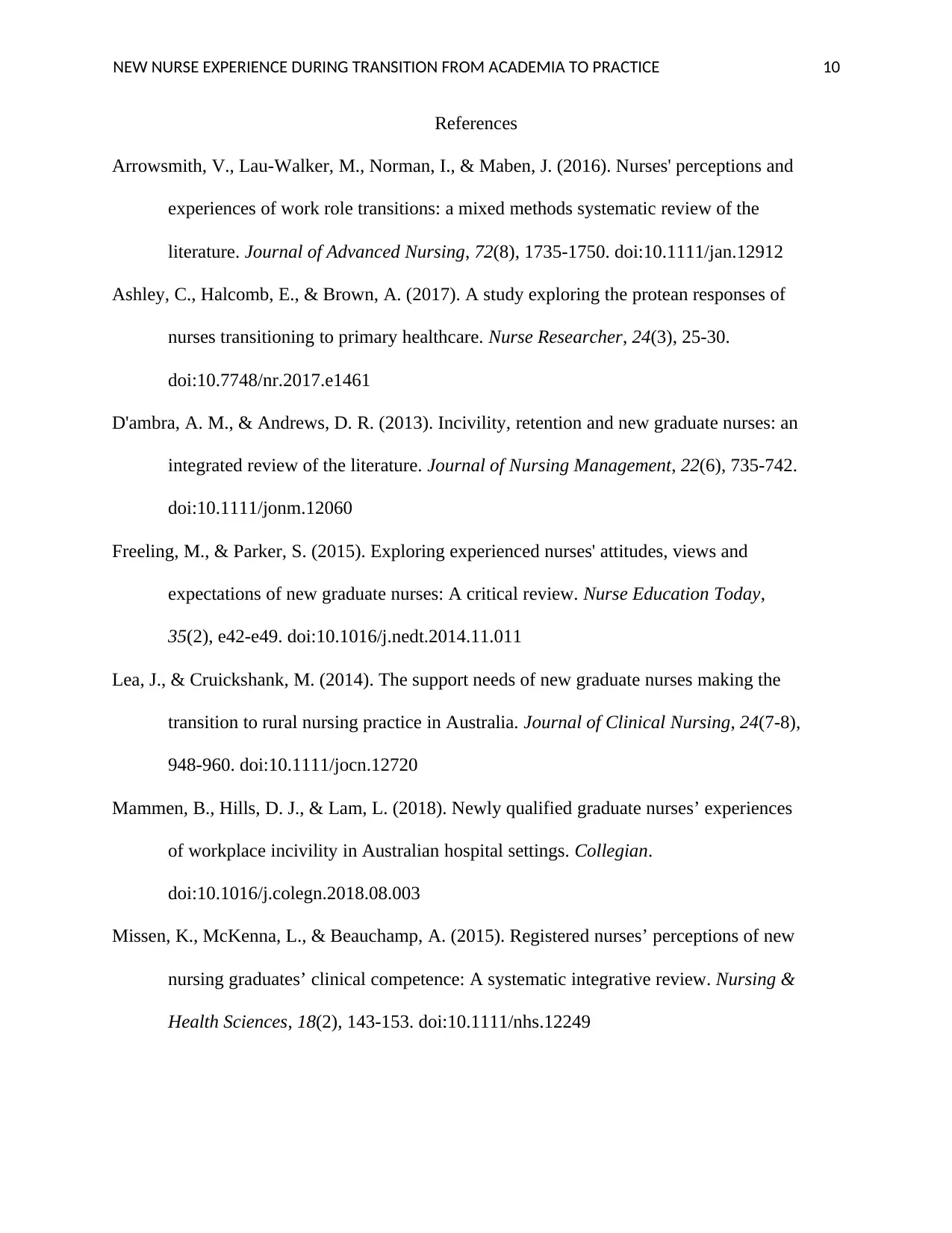
NEW NURSE EXPERIENCE DURING TRANSITION FROM ACADEMIA TO PRACTICE 10
References
Arrowsmith, V., Lau-Walker, M., Norman, I., & Maben, J. (2016). Nurses' perceptions and
experiences of work role transitions: a mixed methods systematic review of the
literature. Journal of Advanced Nursing, 72(8), 1735-1750. doi:10.1111/jan.12912
Ashley, C., Halcomb, E., & Brown, A. (2017). A study exploring the protean responses of
nurses transitioning to primary healthcare. Nurse Researcher, 24(3), 25-30.
doi:10.7748/nr.2017.e1461
D'ambra, A. M., & Andrews, D. R. (2013). Incivility, retention and new graduate nurses: an
integrated review of the literature. Journal of Nursing Management, 22(6), 735-742.
doi:10.1111/jonm.12060
Freeling, M., & Parker, S. (2015). Exploring experienced nurses' attitudes, views and
expectations of new graduate nurses: A critical review. Nurse Education Today,
35(2), e42-e49. doi:10.1016/j.nedt.2014.11.011
Lea, J., & Cruickshank, M. (2014). The support needs of new graduate nurses making the
transition to rural nursing practice in Australia. Journal of Clinical Nursing, 24(7-8),
948-960. doi:10.1111/jocn.12720
Mammen, B., Hills, D. J., & Lam, L. (2018). Newly qualified graduate nurses’ experiences
of workplace incivility in Australian hospital settings. Collegian.
doi:10.1016/j.colegn.2018.08.003
Missen, K., McKenna, L., & Beauchamp, A. (2015). Registered nurses’ perceptions of new
nursing graduates’ clinical competence: A systematic integrative review. Nursing &
Health Sciences, 18(2), 143-153. doi:10.1111/nhs.12249
References
Arrowsmith, V., Lau-Walker, M., Norman, I., & Maben, J. (2016). Nurses' perceptions and
experiences of work role transitions: a mixed methods systematic review of the
literature. Journal of Advanced Nursing, 72(8), 1735-1750. doi:10.1111/jan.12912
Ashley, C., Halcomb, E., & Brown, A. (2017). A study exploring the protean responses of
nurses transitioning to primary healthcare. Nurse Researcher, 24(3), 25-30.
doi:10.7748/nr.2017.e1461
D'ambra, A. M., & Andrews, D. R. (2013). Incivility, retention and new graduate nurses: an
integrated review of the literature. Journal of Nursing Management, 22(6), 735-742.
doi:10.1111/jonm.12060
Freeling, M., & Parker, S. (2015). Exploring experienced nurses' attitudes, views and
expectations of new graduate nurses: A critical review. Nurse Education Today,
35(2), e42-e49. doi:10.1016/j.nedt.2014.11.011
Lea, J., & Cruickshank, M. (2014). The support needs of new graduate nurses making the
transition to rural nursing practice in Australia. Journal of Clinical Nursing, 24(7-8),
948-960. doi:10.1111/jocn.12720
Mammen, B., Hills, D. J., & Lam, L. (2018). Newly qualified graduate nurses’ experiences
of workplace incivility in Australian hospital settings. Collegian.
doi:10.1016/j.colegn.2018.08.003
Missen, K., McKenna, L., & Beauchamp, A. (2015). Registered nurses’ perceptions of new
nursing graduates’ clinical competence: A systematic integrative review. Nursing &
Health Sciences, 18(2), 143-153. doi:10.1111/nhs.12249
Paraphrase This Document
Need a fresh take? Get an instant paraphrase of this document with our AI Paraphraser
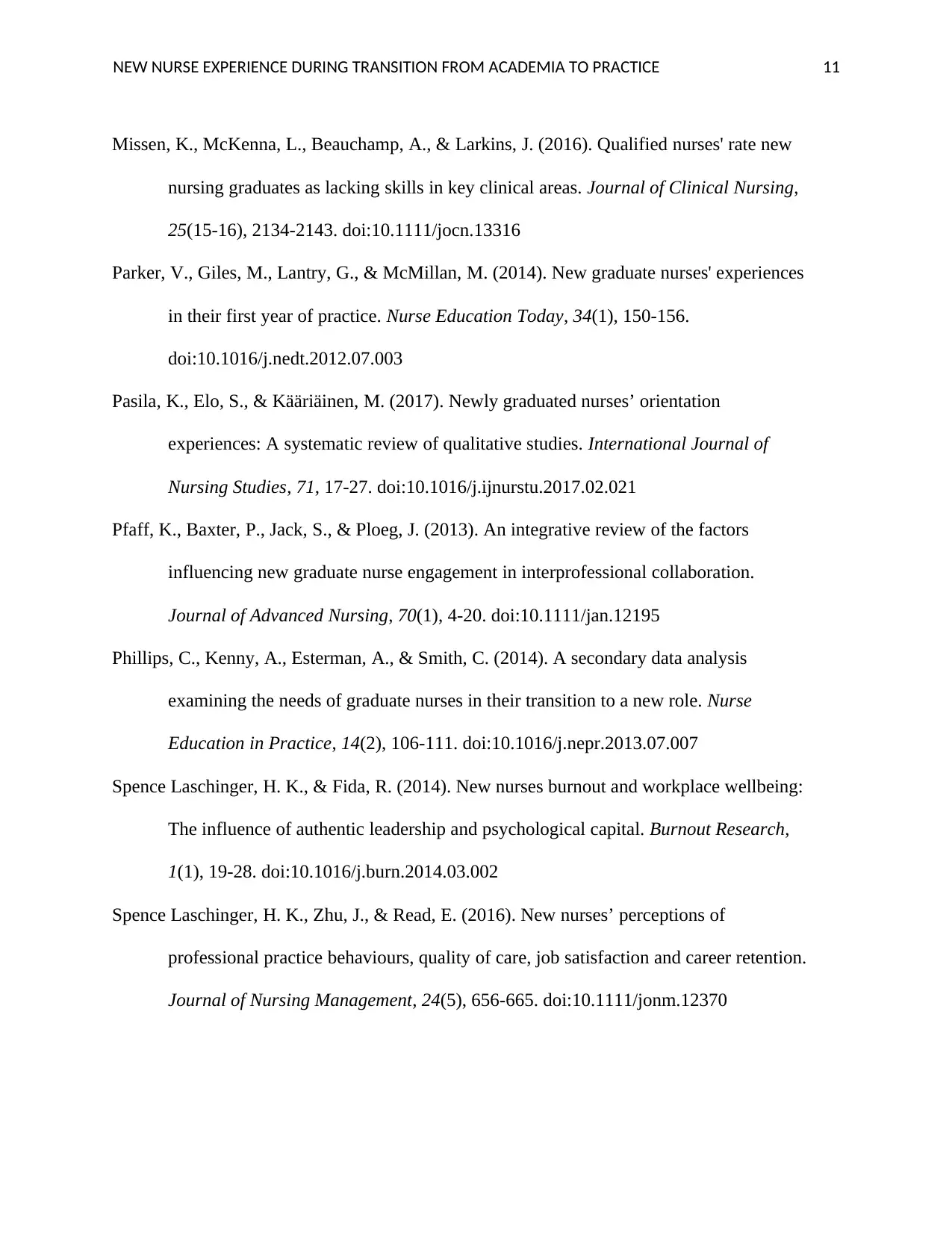
NEW NURSE EXPERIENCE DURING TRANSITION FROM ACADEMIA TO PRACTICE 11
Missen, K., McKenna, L., Beauchamp, A., & Larkins, J. (2016). Qualified nurses' rate new
nursing graduates as lacking skills in key clinical areas. Journal of Clinical Nursing,
25(15-16), 2134-2143. doi:10.1111/jocn.13316
Parker, V., Giles, M., Lantry, G., & McMillan, M. (2014). New graduate nurses' experiences
in their first year of practice. Nurse Education Today, 34(1), 150-156.
doi:10.1016/j.nedt.2012.07.003
Pasila, K., Elo, S., & Kääriäinen, M. (2017). Newly graduated nurses’ orientation
experiences: A systematic review of qualitative studies. International Journal of
Nursing Studies, 71, 17-27. doi:10.1016/j.ijnurstu.2017.02.021
Pfaff, K., Baxter, P., Jack, S., & Ploeg, J. (2013). An integrative review of the factors
influencing new graduate nurse engagement in interprofessional collaboration.
Journal of Advanced Nursing, 70(1), 4-20. doi:10.1111/jan.12195
Phillips, C., Kenny, A., Esterman, A., & Smith, C. (2014). A secondary data analysis
examining the needs of graduate nurses in their transition to a new role. Nurse
Education in Practice, 14(2), 106-111. doi:10.1016/j.nepr.2013.07.007
Spence Laschinger, H. K., & Fida, R. (2014). New nurses burnout and workplace wellbeing:
The influence of authentic leadership and psychological capital. Burnout Research,
1(1), 19-28. doi:10.1016/j.burn.2014.03.002
Spence Laschinger, H. K., Zhu, J., & Read, E. (2016). New nurses’ perceptions of
professional practice behaviours, quality of care, job satisfaction and career retention.
Journal of Nursing Management, 24(5), 656-665. doi:10.1111/jonm.12370
Missen, K., McKenna, L., Beauchamp, A., & Larkins, J. (2016). Qualified nurses' rate new
nursing graduates as lacking skills in key clinical areas. Journal of Clinical Nursing,
25(15-16), 2134-2143. doi:10.1111/jocn.13316
Parker, V., Giles, M., Lantry, G., & McMillan, M. (2014). New graduate nurses' experiences
in their first year of practice. Nurse Education Today, 34(1), 150-156.
doi:10.1016/j.nedt.2012.07.003
Pasila, K., Elo, S., & Kääriäinen, M. (2017). Newly graduated nurses’ orientation
experiences: A systematic review of qualitative studies. International Journal of
Nursing Studies, 71, 17-27. doi:10.1016/j.ijnurstu.2017.02.021
Pfaff, K., Baxter, P., Jack, S., & Ploeg, J. (2013). An integrative review of the factors
influencing new graduate nurse engagement in interprofessional collaboration.
Journal of Advanced Nursing, 70(1), 4-20. doi:10.1111/jan.12195
Phillips, C., Kenny, A., Esterman, A., & Smith, C. (2014). A secondary data analysis
examining the needs of graduate nurses in their transition to a new role. Nurse
Education in Practice, 14(2), 106-111. doi:10.1016/j.nepr.2013.07.007
Spence Laschinger, H. K., & Fida, R. (2014). New nurses burnout and workplace wellbeing:
The influence of authentic leadership and psychological capital. Burnout Research,
1(1), 19-28. doi:10.1016/j.burn.2014.03.002
Spence Laschinger, H. K., Zhu, J., & Read, E. (2016). New nurses’ perceptions of
professional practice behaviours, quality of care, job satisfaction and career retention.
Journal of Nursing Management, 24(5), 656-665. doi:10.1111/jonm.12370

NEW NURSE EXPERIENCE DURING TRANSITION FROM ACADEMIA TO PRACTICE 12
Zheng, R., Lee, S. F., & Bloomer, M. J. (2016). How new graduate nurses experience patient
death: A systematic review and qualitative meta-synthesis. International Journal of
Nursing Studies, 53, 320-330. doi:10.1016/j.ijnurstu.2015.09.013
Zheng, R., Lee, S. F., & Bloomer, M. J. (2016). How new graduate nurses experience patient
death: A systematic review and qualitative meta-synthesis. International Journal of
Nursing Studies, 53, 320-330. doi:10.1016/j.ijnurstu.2015.09.013
⊘ This is a preview!⊘
Do you want full access?
Subscribe today to unlock all pages.

Trusted by 1+ million students worldwide
1 out of 12
Related Documents
Your All-in-One AI-Powered Toolkit for Academic Success.
+13062052269
info@desklib.com
Available 24*7 on WhatsApp / Email
![[object Object]](/_next/static/media/star-bottom.7253800d.svg)
Unlock your academic potential
Copyright © 2020–2026 A2Z Services. All Rights Reserved. Developed and managed by ZUCOL.





